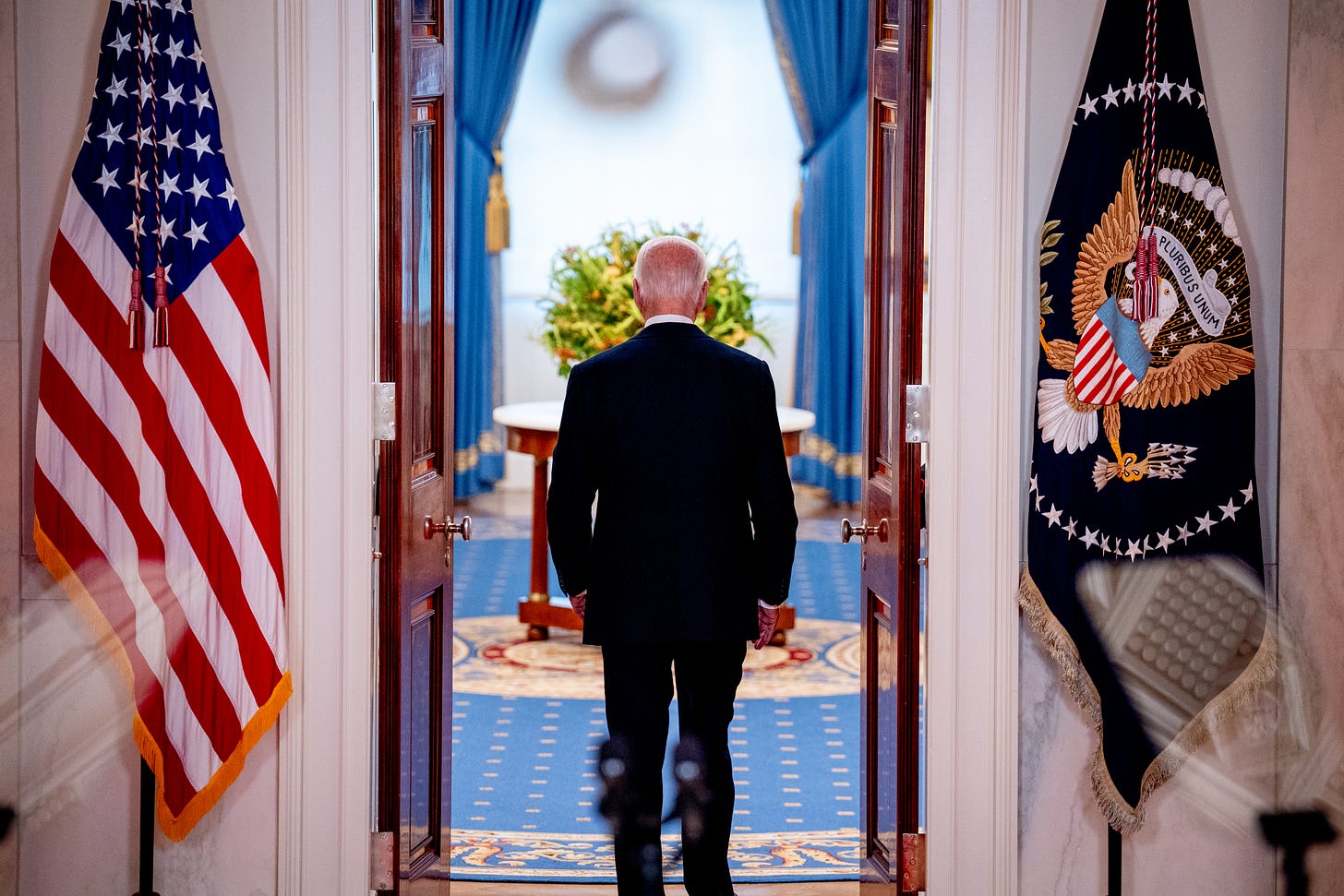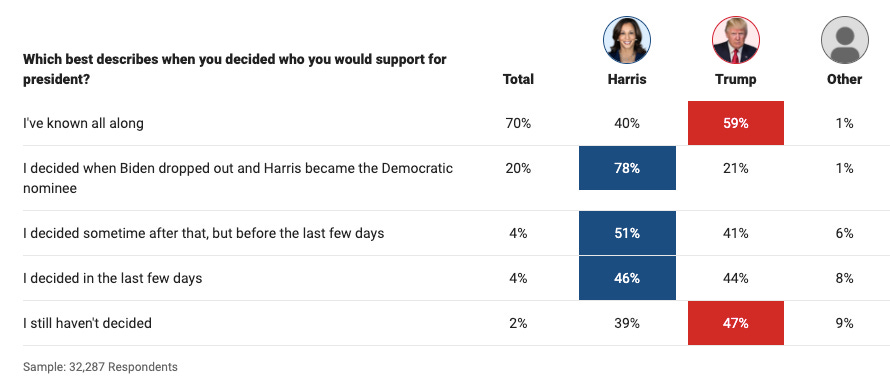
Biden World Thinks He Should Have Stayed in the Race. What Are They Smoking?
The question is not whether he should have dropped out. It’s why he didn’t do so earlier.

SHOULD JOE BIDEN HAVE STAYED in the 2024 presidential race? Would he have done better than Kamala Harris did?
The latest version of this fantasy showed up in Saturday’s Washington Post story about Biden’s legacy and regrets. Buried in the article from the Post’s Tyler Pager is this nugget:
Biden and some of his aides still believe he should have stayed in the race, despite the rocky debate performance and low poll numbers that prompted Democrats to pressure him to drop out. Biden and these aides have told people in recent days that he could have defeated Trump, according to people familiar with their comments. . . .
The Post report has sparked mischievous hype on the right. “Biden regrets leaving presidential race, thinks he could’ve beaten Trump,” clucked the New York Post. Fox News posted a similar headline.
It’s not clear whether Biden actually believes this. His aides and associates have given varying accounts. But some people in his circle seem to be nursing the idea that he should have remained in the race and would have succeeded where Harris failed.
They’re wrong. Let’s put this delusion to bed.
We can’t know for sure how a Trump-Biden rematch would have turned out, since it never went the distance. But we can get a pretty clear picture, thanks to the massive VoteCast survey of the 2024 electorate. The survey’s findings, published in their most complete form by Fox News, make a strong case that Harris did better than Biden would have.
Let’s start with their respective favorability ratings. Biden’s score was abysmal: 40 percent of respondents viewed him favorably and 58 percent unfavorably. Harris’s rating was almost even: 47 percent favorable and 50 percent unfavorable. That’s a 15-point net advantage for her.
The survey also shows how people voted depending on their judgments of Biden’s presidency. Harris picked up 16 percent of voters who disapproved of Biden’s performance in office. By comparison, she lost only 7 percent of voters who approved of his performance. In the separate media exit poll, Harris did even better, picking up 16 percent of those who disapproved of Biden while losing only 3 percent of those who approved.
You could argue that these numbers don’t fully capture how Biden would have done. He, too, might have won a chunk of his disapprovers, since some of them also disliked Trump. And maybe if Biden had stayed in and showed more vitality in the campaign’s final months than he did in the debate, his favorable rating at the end would have been higher. Certainly, some Democrats who were wary of Biden would have “come home” to his camp as the election neared.
But one question in the VoteCast survey goes right to the heart of the Biden re-election fantasy. It asked people when they made up their minds and which candidate they voted for. Here are the results, as published by Fox News:
The top row of the table shows that 70 percent of voters knew all along which way they were going to vote. Of these, 59 percent voted for Trump and 40 percent for Harris. Since Harris didn’t replace Biden till July, it’s logical to infer that those 40 percent were going to vote for Biden. She basically inherited them.
Losing 70 percent of the electorate by a spread of 59 percent to 40 percent is very bad. It means that Biden put Harris in a serious hole. When you do the math, it means that she began her leg of the relay with locked-in support from only 28 percent of the electorate, compared to Trump’s 41 percent.
WHAT HAPPENED WHEN HARRIS TOOK OVER? The next row of the table answers that question. Twenty percent of voters made their decisions when Biden dropped out and Harris stepped in. They went for Harris over Trump by a ratio of nearly four to one.
That’s a big deal. Winning one-fifth of the electorate by 78 percent to 21 percent gets you a net gain of about 11 percent of the overall vote. If you think of the election as a layered sequence—the candidate starts with a base of loyalists and then adds supporters as they commit to her—the Biden-to-Harris handover was remarkably effective. Biden handed his vice president a 13-point baseline deficit, and she closed the gap to about 2 points.
The remaining rows of the table tell the rest of the story. Harris continued to outpoll Trump among people who made up their minds in the weeks that followed. Among people who decided at the end, she broke even. (The VoteCast poll began during early voting, so the bottom row shows people who hadn’t yet cast their ballots. Another version of the table shows that the late deciders—the 6 percent of voters in the bottom two rows—split evenly between Trump and Harris.)
That’s the ball game. Harris entered the campaign with a big baseline deficit and nearly closed that gap when she replaced Biden. But she couldn’t win over enough late deciders to catch Trump.
IF THE BIDEN-TO-HARRIS HANDOFF had been a mistake, the VoteCast table would show it. You’d see a net loss for the Democratic ticket among people who made their voting decision after he stepped out and she stepped in. Instead, what you see is a big net gain.
In addition, if Harris had performed poorly in the weeks after the handover, you’d see her losing to Trump in the third row of the table. Instead, she came out about 10 points ahead. Maybe she could have done better. And maybe a different Democrat could have done even better. But there’s no evidence that Biden would have.
There’s plenty to regret about Biden’s campaign. Maybe he should have skipped the 2024 race and let a new generation of Democrats fight it out. Maybe he should have focused less on passing good legislation and more on taking credit. Maybe—and it pains me to say this, as a Bulwark institutionalist—he shouldn’t have counted on a majority of Americans to stand up for the rule of law.
But handing the reins to Harris in July, rather than sticking it out, wasn’t one of his mistakes. His mistake was that he didn’t do so sooner.
















